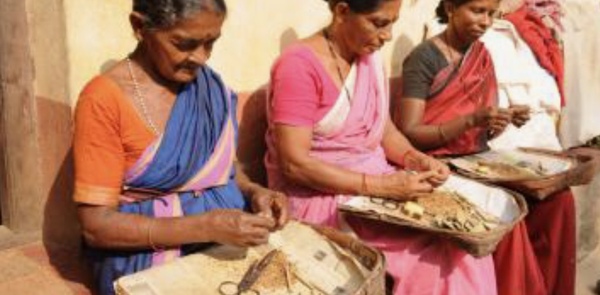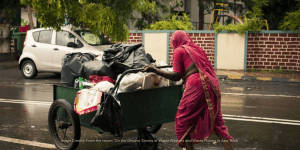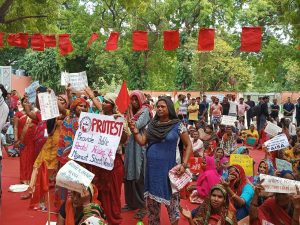Poor Wages, No Social Security Hurt Women Beedi Workers

“I have been rolling beedis since I was fifteen. Our whole community is dependent on the profession. Our employers underpay us, our pension never arrives without a struggle and the state is oblivious to our condition- where do we go from here?” said Aysha Begum, a Beedi worker from Sengottai in Tenkasi district of Tamil Nadu.
Aysha is now the sole breadwinner for her family of five after her husband was left incapacitated to work due to a heart ailement. Even after rolling 500 beedis a day, she earns Rs 150, barely allowing her to make ends meet.
About 71% of beedi workers in India are women, according to a recent report. Close to 96% work from home based units, while only 4% are employed in registered establishments or factories. Half of the workforce are Muslim and Christian and mostly belong to Other Backward Classes.
With the new Code on Social Security 2020 which states that women will receive employment benefits only under ‘establishments’, vulnerable home-based workers, such as beedi rollers, will be left unprotected under the new rules.
“Women are the worst affected in the industry. Their employers are invisible in this scenario, and they are completely dependent on middlemen who exploit their economic and social status. Their health and safety is jeopardized in multifold ways”, said Sachi Satpathy, the principal investigator of the report ‘ Knowledge Gaps in Existing Research on India’s Women Beedi Rollers’, in an interview with BehanBox.
There is a massive gender gap in wages in the Beedi rolling industry. Women workers earn less than half the daily wage( Rs. 126 per day) than men (Rs. 266). In fact, women earn less than the national minimum wage of Rs 178 set by the Code on Wages, 2019. What women Beedi rollers earn only accounted for 24% of the household expenses. In the last 25 years, there has been a significant decline in the number of Beedi rollers, particularly in the southern states of Tamil Nadu, Andhra Pradesh/Telangana and Karnataka, raising questions on the efficacy of state government policies and alternate livelihood options of women engaged in the industry.
Working Conditions of Women Beedi Workers
“My hands are swollen and I have a clot in my blood vessels because I have been rolling beedis for thirty years”, said Aryamullai (45) from Tenkasi district. She is a member of the Beedi workers union in her village. She also suffers from frequent breathlessness and abdominal pain.
“The thread to cut the tendu leaf has scarred my fingers several times”, she told BehanBox.
92.5% women workers reported suffering from bronchitis according to the survey which formed the basis of the report on Beedi workers. 90.5% women Beedi rollers had severe body aches. The health problems are primarily due to inhalation of large amounts of tobacco dust during beedi rolling, and sitting in the same position for eight to ten hours a day.
Women workers spend around 29% of their average annual income on treatment and medication for health related concerns found the survey. At least 2.5% workers had a higher health expenditure than their income from beedi rolling.
“ Women workers are in contact with food and water shared by everyone in the house which they pass on to other members of the household. My husband has also developed an itching and sore throat in his old age due to my work”, says Aysha Begum.
“What is the point of the government declaring a minimum calorie count for women based on nutritional needs, if they have no means to secure their livelihoods and access to healthcare?”, asks Aryamullai, who is on the brink of leaving the profession due to chronic health issues.
More than half of the women Beedi workers want to shift to another profession according to the report. Women who left the industry either set up small shops of their own or join the Mahatma Gandhi National Rural Employment Guarantee Act 2005.
“This is a multi-crore industry controlled by elites and women are at the bottom of the rung.The smoking culture in India is such that the poor cannot afford high quality cigarettes and therefore there is a constant demand for Beedis. Offering alternative livelihood options and skill training is not feasible in this case, unless there are provision of secure government jobs for women workers”, said Mr. R Karumalaiyan, President of Beedi Workers Union in Tirunelveli district of Tamil Nadu.
Wages and Social Security Benefits
“It’s been over two years since my pension is due. With my health deteriorating by the day, it is getting harder for me to approach officials and government departments in faraway districts for dues which are essentially my right” , said Mariamma, a Beedi worker from Tenkasi district in Tamil Nadu.
98% of women beedi workers in the unorganized sector are not eligible for any social security benefits nor have any signed contract with their employers.
Apart from the gender pay gap mentioned earlier, the wage rates for Beedi workers are also unfair, largely decided by the middleman.
“Either the company or agent or middleman decides the wage rate. This is one of the reasons behind non-revision of the wage rate also, as they target the poorest and the most vulnerable of women to ensure that they do not know who their employers are,” said Sathyapadi.
Wage exploitation also takes place when women are given sub-standard raw material and then a certain portion of their finished product is rejected by the middlemen who while keeping the Beedis do not pay the women workers.
“Inconsistent and unreliable data lead to aggravated vulnerability and exploitation of the beedi workers”, said Sathyapadi. The Annual Survey of Industries (ASI) data cover only factory-based workers, which excludes more than 96% of the home-based Beedi workers.
The cess collected as part of the Beedi Workers Welfare Cess Act, 1976 , which was the only source for financing Beedi workers’ welfare programmes, also suffered after the implementation of Goods and Services Tax (GST) in 2017-18.
#Women Workers, #Gender Pay Gap, #Code On Security #Labour Laws
We believe everyone deserves equal access to accurate news. Support from our readers enables us to keep our journalism open and free for everyone, all over the world.




